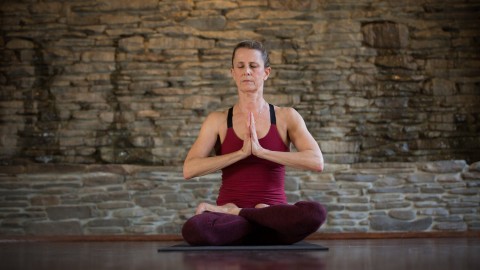Question to Osho: WHY IS EVERY HUMAN BEING FULL OF PROBLEMS AND UNHAPPY?
THE FIRST THING: because man can be tremendously happy, the possibility exists, hence, his unhappiness. Nobody else – no animal, no bird, no tree, no rock – can be so happy as man. The possibility, the tremendous possibility that you can be happy, eternally happy, that you can be at the top of a bliss mountain, creates unhappiness. And when you see around you, you are just in the valley, a dark valley, and you could have been at the top of the peak: the comparison, the possibility, and the actuality.
If you were not born to be Buddhas, then there would be no unhappiness. So, the more perceptive a person is, the more unhappy. The more sensitive a person is, the more unhappy. The more alert a person is, the more he feels the sadness, the more he feels the potentiality and the contradiction, that nothing is happening and he’s stuck.
Man is unhappy because man can be tremendously happy. And unhappiness is not bad. It is the very drive that will take you to the peak. If you are not unhappy, then you will not move. If you are not unhappy in your dark valley, why should you make any effort to climb uphill? It is going to be arduous – unless the sun shining at the top becomes a challenge, unless the very existence of the top creates a mad urge to reach, unless the very possibility provokes you to seek and search.
People who are not very alert, sensitive, are not very unhappy. Have you seen any idiot unhappy? – Impossible. An idiot cannot be unhappy because he cannot be aware of the possibility that he is carrying within himself.
You are conscious that you are a seed, and the tree can happen. It is just by the corner. The goal is not very far away; that makes you unhappy. It is a good indication. To feel unhappiness deeply is the first step. Certainly, Buddha feels it more than you. That’s why he renounced the valley and he started climbing uphill. Small things that you come across every day became great provocations for him. Seeing a man ill, seeing an old man leaning on his staff, seeing a dead body, was enough; that very night he left his palace. He became aware of where he was: “The same is going to happen to me. Sooner or later, I will become ill and old and dead, so what is the point of being here? Before the opportunity is taken away from me, I should attain something which is eternal.” A great desire arose in him to reach the peak. That peak we call God; that peak we call kaivalya, that peak we call moksha, nirvana; but that peak exists within you like a seed. It has to unfold. So great sensitive souls suffer more. Idiots don’t suffer, dullards don’t suffer. They are already happy in their ordinary life: earning a little money, making a small house – finished. Their whole possibility is only that.
If you are aware that this can’t be the goal, this can’t be the destiny, then a great suffering will enter into your being like a sharp sword. It will penetrate to the very core of your being. A great scream will arise in your heart and that will be the beginning of a new life, of a new style of life, of a new foundation of life.
So, the first thing I would like to say is: to feel unhappy is blissful; to feel unhappy is a blessing. Not to feel so is to be dull.
The second thing: human beings remain in misery because they go on creating misery for themselves.
So first, understand it. To be unhappy is good, but I am not saying that you should go on creating your unhappiness more and more. I am saying: it is good because it provokes you to go beyond it.
But go beyond it, otherwise it is no good.
People go on creating their pattern of misery. There is a reason: the mind resists change. The mind is very orthodox. It wants to continue on the old path, because the old is known. If you are born a Hindu, you will die a Hindu. If you are born a Christian, you will die a Christian. People don’t change. A particular ideology becomes so ingrained in you that you become afraid to change it. You feel apprehensive because with this you are familiar. The new – who knows? – May not even be so good, as the old. And the old is known; you are well acquainted with it. Maybe it is miserable, but at least it is familiar. On each step, every moment of life you are deciding something, whether you know it or not. The decision encounters you every moment – whether to follow the old path that you have been following up to now, or to choose the new. At every step the road bifurcates. And there are two types of people. Those who choose the well-trodden path; of course, they move in a circle.
They choose the known, and the known is a circle. They have known it already. They choose their future just as it has been in their past. They move in a circle. They go on making their past their future. No growth happens. They are simply repeating; they are automata, robot-like.
Then there is another type of person, type of awareness, who is always alert to choose the new.
Maybe the new creates more suffering, maybe the new leads astray, but at least it is new. It will not be just a repetition of the past. The new has the possibility of learning, growth, of the potential becoming actual.
So remember, whenever there is to be a choice, choose the untrodden path. But you have been taught just the contrary. You have been taught always to choose the known. You have been taught to be very clever and cunning. Of course, there are comforts with the known. One comfort is that you can remain unconscious with the known. There is no need to be conscious. If you are following the same path you can move almost asleep, like a somnambulist. If you are coming back to your own home, and every day you have been coming, you need not be aware; you can just come unconsciously. When it is time to turn to the right, you turn; there is no need to keep any alertness.
That’s why people like to follow the old path: no need to be aware. And awareness is one of the most difficult things to achieve. Whenever you are moving in a new direction, you have to be aware at each step.
Choose the new. It will give you awareness. It is not going to be comfortable. Growth is never comfortable; growth is painful. Growth goes through suffering. You pass through fire, but only then you become pure gold. Then all that is not gold is burnt, reduced to ashes. Only the purest remains in you. You have been taught to follow the old because on the old you will be committing less mistakes. But you will commit the basic mistake, and the basic mistake will be this: that growth happens only when you remain available to the new, with the possibility of committing new mistakes. Of course, there is no need to repeat an old mistake again and again, but be capable and courageous for committing new mistakes – because each new mistake makes learning, becomes a learning situation. Each time you go astray, you have to find the path back home. And this going and coming, this constant forgetting and remembering, creates an integration within your being.
Always choose the new; even if it looks worse than the old I say, always choose the new. It looks inconvenient – choose the new. It is uncomfortable, insecure – choose the new. It is not a question of ‘new’; it is to give you an opportunity to be more aware. Efficiency has been taught to you as the goal. It is not. Alertness is the goal. Efficiency makes you follow the old path again and again, because you will be more efficient on the old path. You will know all the nooks and corners. You have travelled on it for so many years, or maybe so many lives; you will be more and more efficient.
But efficiency is not the goal. Efficiency is the goal for a mechanism. A machine has to be efficient, but a man? – Man is not a machine. A man has to be more aware, and if efficiency comes out of awareness, good, beautiful. If it comes at the cost of awareness you are committing a great sin against life, and then you will remain unhappy. And this unhappiness will become a pattern. You will simply move in a vicious circle. One unhappiness will lead you to another, and so on and so forth.
Unhappiness as an awareness is a blessing, but unhappiness as a style of life is a curse.
Don’t make it your style of life. I see many people have made it their style of life. They don’t know any other style of life. Even if you tell them, they won’t listen. They will go on asking why they are unhappy, and they won. The theory of karma simply says that whatsoever is happening to you is your doing. Somewhere, on an unconscious level, you must be creating it – because nothing happens to you from the outside.
Everything bubbles from the inside. If you are sad, you must be creating your sadness somewhere in your innermost being. From there it comes. You must be manufacturing it somewhere within your soul. Watch: if you are miserable, meditate on your misery, on how you create it. You always ask, “Who is responsible for misery?” Nobody is responsible except you. The mind goes on saying to you that if you are a husband, your wife is creating your misery. If you are a wife, your husband is creating your misery. If you are poor, the rich are creating your misery. It always goes on throwing responsibility on somebody else.
This has to be a very fundamental understanding: that except you, nobody is responsible. Once you understand it things start changing. If you are creating your misery and you love it, then go on creating. Then don’t create a problem out of it. It is nobody’s business to interfere with you.
If you want to be sad, you love to be sad, be perfectly sad. But if you don’t want to be sad, then there is no need – don’t create. Watch how you create your misery: what is the pattern? – How have you managed it inside? People are continuously creating their moods. You go on throwing the responsibility on others; then you will never change. Then you will remain miserable, because what can you do? If others are creating, what can you do?. Unless others change, nothing is in your hands. By throwing responsibility on others, you become a slave. Take the responsibility into your own hands.
A few days ago a sannyasin told me that her husband has always been creating problems for her.
And when she tells her story it will look, apparently, that of course the husband is responsible. She has eight children from the husband, and then the husband has three more children from another woman, and one child from his secretary. He has been continuously fooling around with any woman that comes along. Of course, anybody will sympathize with this poor woman. She has suffered a lot, and the game continues. The husband is not earning much. The woman, the wife, earns, and she has to pay for these children which he has brought into the world from other women also. Of course, she is in great misery, but who is responsible? I told her, “If you are really in misery, why should you continue to be with this man? Drop out. You should have dropped out long before. There is no need to continue.” And she understood, which is a rare thing – very late, very delayed, but still not too late. Still, her life is there. Now if she insists that she would like to remain with this man, then she is insisting for her own misery. Then she is enjoying the miserable trip. Then she is enjoying condemning the husband; then she is enjoying attracting sympathy from everybody else. And of course, with whomsoever she will come in contact with, they will sympathize with the poor woman.
Never ask for sympathy. Ask for understanding, but never ask for sympathy. Otherwise, sympathy can be such a good pay-off that you would like to remain miserable. Then you have some investment in your misery. If you are no more miserable, people won’t sympathize with you. Have you watched it? – Nobody sympathizes with a happy man. It is something absolutely absurd. People should sympathize with the happy man, but nobody sympathizes. In fact, people feel antagonistic to a happy man. In fact, to be happy is very dangerous. To be happy, and express your happiness, you are putting yourself in very great danger – everybody will be your enemy, because everybody will feel, “How come I am unhappy and you have become happy? Impossible! This cannot be allowed. This is too much.”
Tags: Patanjali Sensitive Souls Suffer More









